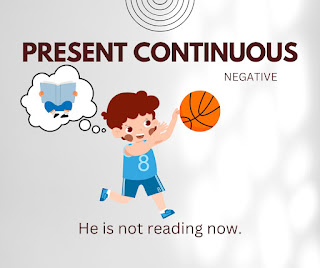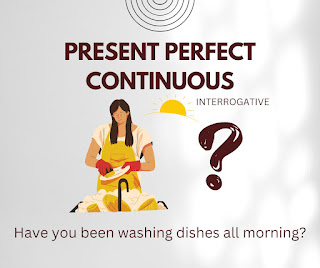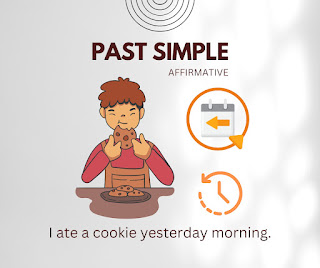1. Present Simple
Affirmative: Subject + verb
(-s/-es → he, she, it) + complement
I drink coffee everyday.
She goes swimming weekly.
Negative: Subject + don’t /
doesn’t + verb + complement
I don’t drink coffee everyday.
She doesn’t go swimming .
Interrogative: Do/ Does +
Subject + verb + complement?
Do you drink coffee everyday?
Does she drink coffee everyday?
Cand folosim Present Simple?
→ obiceiuri/ rutina ( cu always/ usually/ everyday etc.)
He usually goes to the market on Mondays.
→ adevaruri general valabile/ stiintifice
Water freezes at 0 degrees.
→ preferinte personale (cu
love, hate, like, dislike)
I love
→ comentarii sportive, retete, recenzii
Beckham wins the ball, crosses and Owen
scores!
→ orare (cu
valoare de viitor)
His train arrives at
Folosit cu : usually,
often, seldom, always, never, every day/week/month/year, in the
morning/afternoon/evening, at night/weekend, on Fridays etc.
2. Present Continuous
Affirmative: Subject + am/is/are +
verb - ing + complement
I am writing at the moment .
He is reading now.
Negative: Subject + am/is/are +
not + verb- ing + complement
I am not writing at the moment.
He is not reading now.
Interrogative: Am/Is/Are +
Subject + verb -ing + complement?
Cand folosim Present Continuous?
→ pentru actiuni care se desfasoara in
momentul vorbirii
Mary is doing the washing up.
→ actiuni temporare
We are decorating the living room this
week.
→ situatii in desfasurare/ schimbare
The air is becoming more and more
polluted.
→ planuri de viitor stabilite/concrete
I’m going out with Tony tonight.
→ obiceiuri enervante
She is always biting her nails. So
annoying!
Folosit cu: now,
at the moment, at present, these days, nowadays, today, tonight, etc.
3. Present Perfect
Affirmative: Subject + have/has
+ past participle + complement
I have been to
She has lived here for the last 7
years.
Negative : Subject + have/has +
not +past participle +complement
I have not been to Portugal .
She has not lived here ….
*haven’t / hasn’t
Interrogative: Have/Has +
Subject + Past Participle + complement?
Have you been to
Has she lived here for the last 7 years ?
Cand folosim Present Perfect?
→ o actiune petrecuta in trecut, dar care
nu are timpul specificat (accentul cade pe actiune, timpul fiind neimportant
sau necunoscut)
I have washed the dishes.
→ actiune care incepe in trecut si
continua pana in prezent
I have known Bill for ten years.
→ o actiune finalizata recent
I have just finished dinner.
→ experiente personale
She has put on weight.
Folosim cu: for,
since, already, always, just, ever, never, so far, lately, recently etc.
4. Present Perfect Continuous
Affirmative: Subject + have/has
+ been + verb-ing + complement
I have been washing dishes all morning.
She has been reading for 3 hours.
Negative: Subject
+haven’t/hasn’t +been +verb-ing +complement
I haven’t been washing dishes all
morning.
She hasn’t been reading for 3 hours.
Interrogative: Have/ Has+
Subject+ been + verb-ing +complement
Have you been washing dishes all
morning?
Has she been reading for 3 hours.
Cand folosim Present Perfect
Continuous?
→ cand accentul cade pe durata actiunii
care incepe in trecut si continua pana in prezent
He has been painting the walls all
morning.
→ actiune inceputa in trecut care
continua pana in prezent, a carui rezultat este vizibil in prezent
He is tired because he has been working
since
→ actiune enervanta/iritanta
He has been reading my newspaper
without asking me.
5. Past Simple
Affirmative: Subject + verb (2nd form for irregular verbs/ -ed for regular verbs)
I ate a cookie yesterday morning.
She laughed at my joke.
Negative: Subject+ didn’t +
verb (infinitive) +complement
I didn’t eat a cookie yesterday.
She didn’t laugh at my joke.
Interrogative: Did+ subject+
verb (infinitive)+ complement?
Did you eat a cookie yesterday?
Did she laugh at your joke?
Cand folosim Past Simple?
→ actiune petrecuta in trecut , cu timpul
specificat
He posted the invitation yesterday.
→ actiuni trecute consecutive
She locked the door and headed for her
car.
→ obiceiuri trecute
Mr. Smith worked as a gardener in the
past.
Folosit cu: yesterday,
last week/month/year , then, when , three days ago, in 1997 etc.
6. Past Continuous
Affirmative: Subject+ was/were+
verb-ing + complement
I was sleeping when you came home.
They were playing in their room.
Negative: Subject+
wasn’t/weren’t+ verb-ing + complement
I wasn’t sleeping when you came home.
They weren’t playing in their room.
Interrogative: Was/Were+
subject+ verb-ing+ complement?
Was I sleeping when you came home?
Were they playing in their room?
Cand folosim Past Continuous?
→ actiune din trecut in
desfasurare
At 8”clock yesterday I was having
dinner with Mark.
→ cand o actiune din
trecut se afla in desfasurare si este intrerupta de o alta actiune. Utilizam
Past Continuous pentru actiunea in desfasurare si Past Simple pentru actiunea
care o intrerupe.
We were swimming when it started to
rain.
–> doua
actiuni care se intampla in acelasi timp in trecut
Bill was watching TV in the living room
while Tony was having a shower.
→ pentru a descrie
atmosfera, actiunea de fundal a unei povesti
The birds were singing and the sun was
shining and we were walking towards the cabin.
Folosim cu: while,
when, all morning/evening/day/ week etc.
7. Past Perfect
Affirmative: Subject+ had+ Past
Participle+ complement
I had seen him before.
Negative: Subject+ hadn’t+ Past
Participle+ complement
I hadn’t seen him before.
Interrogative: Had+ subject+
Past Participle+ complement?
Had you seen him before?
Cand folosim Past Perfect?
→ cu o actiune care se
petrece inaintea altei actiuni din trecut
Ann had finished cooking by 6’clock.
–> cu
o actiune finalizata in trecut, al carui rezultat a fost vizibil
He had broken his leg a month ago and
he still couldn’t walk properly.
→ pentru o situatie
generala din trecut
Everything had seemed normal at first.
8. Past Perfect Continuous
Affirmative: Subject+ had+
been+ verb-ing+ complement
I had been waiting for 2 hours.
I hadn’t been waiting for 2 hours.
Interrogative: Had+ subject+
been+ verb-ing + complement?
Had you been waiting for 2 hours?
I hadn’t been waiting for 2 hours.
Interrogative: Had+ subject+
been+ verb-ing + complement?
Had you been waiting for 2 hours?
–> cand dorim sa punem accentul pe durata actiunii, care a inceput sau s-a sfarsit inaintea unei alte actiuni din trecut
He had been walking for about an hour before he reached his destination.































